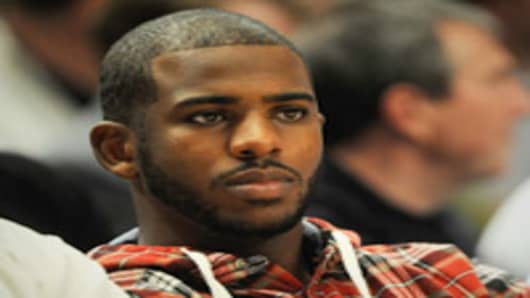On Thursday night, word swirled around the Twitterverse that Chris Paul could be on his way to the Lakers in a trade with the Rockets and the Hornets.
At best, the Hornets get a couple of starters and a draft pick.
At worst? An all out PR disaster for the league within minutes of ratifying its 10-year Collective Bargaining Agreement with the players.
When leagues have owned or controlled teams in the past, they have been careful to tread very lightly. While dumping players has less of an impact on the team's value than teams that aren't for sale, leagues don't want to get into a position of having the fans believe that they are trading players in order to control outcomes that are favorable to the league at large, namely large markets winning.
Out of all the four major leagues, the league the fans think have the most control over competitive balance is the NBA by a mile.
Now, let's get a little deeper.
New Orleans is a sensitive place to pick a fight. Ever since Katrina, it has been a place where no one in corporate America wants to be caught abandoning. Louisiana is the fifth poorest state in the nation.
They spend money on the Saints and the visiting teams love to make road trips to Bourbon Street. They've done less than stellar with the Hornets despite Paul's presence, though they claim to have sold 10,000 season tickets for this upcoming season.
Sure, there's the something for nothing rationale: Might as well get something for Chris Paul before he becomes a free agent next year.
The NBA saved New Orleans when it bought the team a year ago from George Shinn, but now it's their investment. The league is better off selling the team while Paul is there (assuming it is committed to the city) than to sell it when he's gone and the team is in financial straits.
Sure, you won't get anything for Chris Paul after this year, but the NBA doesn't need him past this year. Trade Paul and the books look deflated. The value drops. Use Paul until you can get a new owner committed and the league is golden.
Of course, if the league is willing to approve a move by a new owner -- where they will realize the most value -- it doesn't matter what the Hornets do with Paul. Their value will skyrocket like the Expos did when Major League Baseball sent them to Washington D.C. and drove up the prices.
Lastly, imagine you're a large market owner and David Stern just convinced you to quadruple your revenue sharing payment all in the name of competitive balance. Then he goes and ships Paul to the Lakers. Are you happy?
Questions? Comments? SportsBiz@cnbc.com



